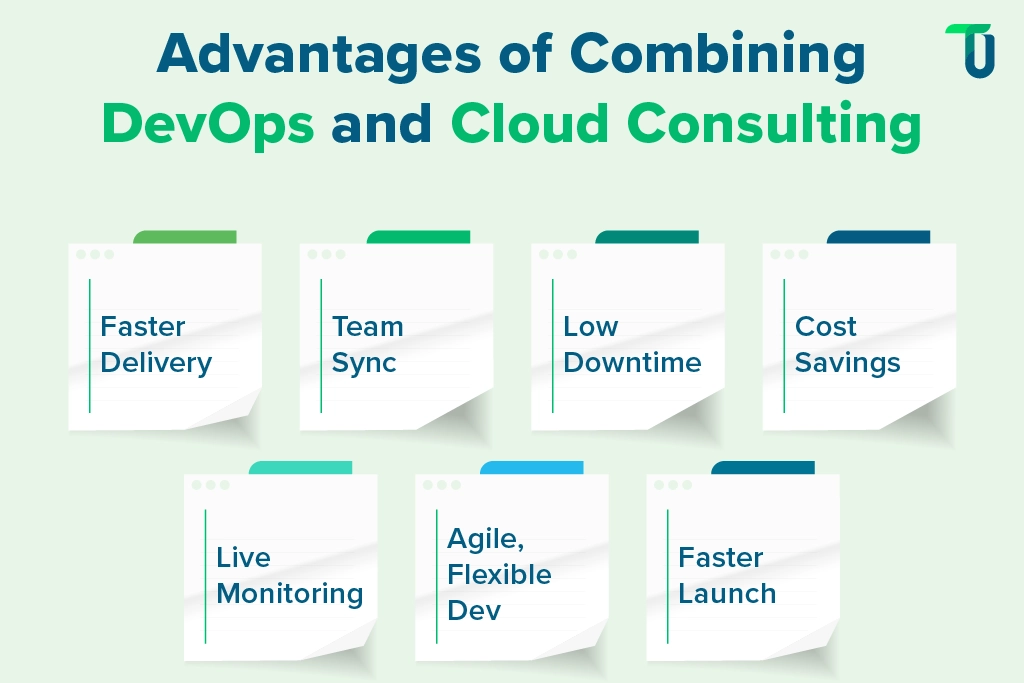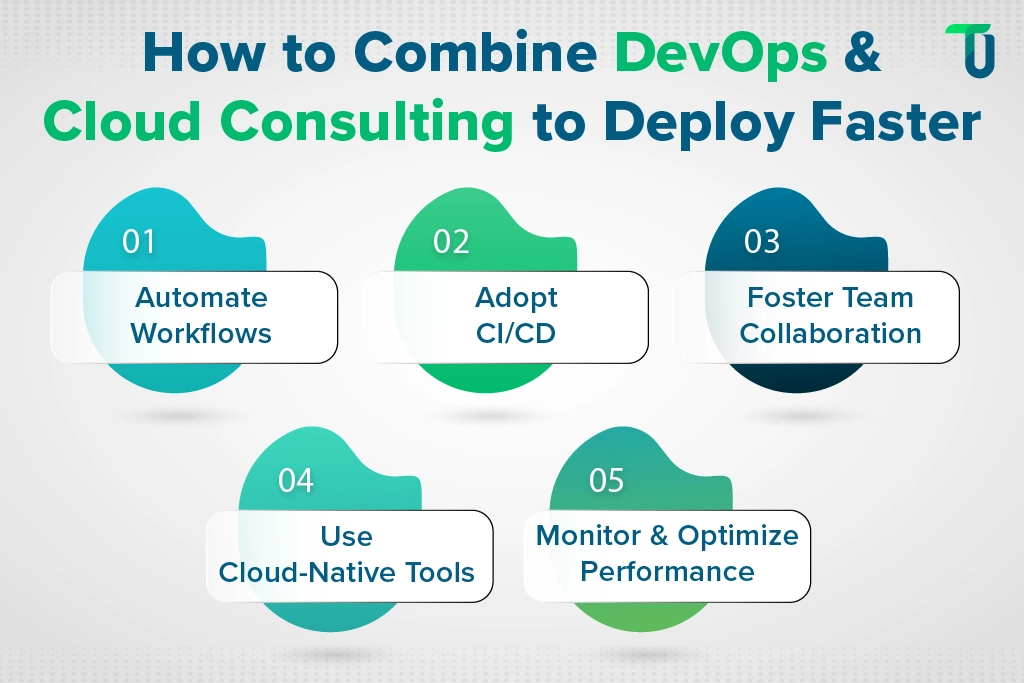What is DevOps: An Overview
DevOps is a way to connect software development and IT operations. It helps teams work together by removing silos between them. This teamwork allows faster and more reliable software delivery. Continuous integration, continuous delivery, and infrastructure as code are some of the Important DevOps practices. These methods help avoid errors and save time.
DevOps also supports automation, which makes processes smoother. Overall, DevOps is not only about tools but also about changing how teams think and work together, focusing on speed, quality, and user needs.
What is Cloud Consulting: An Overview
Cloud consulting helps businesses plan, set up, and improve their use of cloud computing. For startups and early-stage firms looking to scale efficiently, investing in cloud consulting services for early-stage companies ensures a strong foundation with the right cloud strategy.
Consultants guide companies in choosing the right cloud services, moving their data and applications, and making sure everything runs smoothly especially as cloud-first strategies become mainstream across industries. They also focus on keeping data secure, managing costs, and ensuring the system can grow with the business.
Overall, cloud consulting makes it easier for businesses to use cloud technology effectively.
How Do DevOps and Cloud Consulting Work Together?
DevOps and cloud consulting work together to make software delivery faster, manage infrastructure better, and keep systems running at their best. Here are 4 ways they support each other to help teams build reliable and flexible systems.
1. Seamless infrastructure-as-code integration
Cloud consulting helps teams set up Infrastructure as Code with tools like Terraform and AWS CloudFormation. This method turns infrastructure into code that can be easily managed, tracked, and deployed across different environments without mistakes.
Here are some key benefits of Infrastructure as Code:
- Ensures consistent environments across development and production.
- Reduces manual setup errors and mismatches
- Allows version control for infrastructure changes
Also Read: How to Build Scalable Cloud-Based Apps: A Step-by-Step Beginner’s Guide
2. Real-time collaboration with cloud-enabled DevOps pipelines
Cloud consulting introduces tools that allow developers and operations teams to work together instantly. Platforms like GitHub Actions and Azure DevOps connect well with cloud services, so teams can automate tests, builds, and deployments without delays. This leads to better teamwork and quicker problem-solving since everyone sees updates right away.
Key advantages of real-time collaboration include:
- Faster feedback loops between developers and operations
- Centralized control over code and deployments
- Better communication to solve issues quickly
Cloud consulting makes sure these tools fit perfectly into your DevOps pipeline for smooth cooperation.
Take Control of Your Software Releases
Partner with TenUp to cut deployment times, reduce risks, and scale your cloud environment with ease.
3. Automated scaling for continuous deployment
Cloud consulting allows companies to set up automated scaling solutions that match their needs. Services like AWS Auto Scaling or Azure Scale Sets adjust resources based on how much demand there is. This balance keeps apps running smoothly without wasting money on unused resources.
Look at what automated scaling offers:
- Adjusts resources according to real-time demand
- Keeps applications responsive during traffic spikes
- Saves money by scaling down when demand is low
With cloud consulting, businesses get a scalable system ready to handle changes without manual work
4. Cloud-based monitoring for proactive DevOps management
Cloud consulting supports integrating cloud-based monitoring tools such as AWS CloudWatch or Prometheus. These tools provide live data about system health and performance. They alert teams to problems before they become serious. In fact, around 65% of companies using DevOps report better software quality, according to a DevOps Trends Survey by Atlassian & CITE Research in 2020.
Important features of cloud-based monitoring include:
- Real-time alerts for system issues and failures
- Detailed performance tracking across services
- Improved reliability through proactive problem detection
Cloud consulting guides the setup of monitoring tools that fit well with DevOps processes for smoother system management.
TenUp’s Take: Combine DevOps pipelines with cloud-native tools like Terraform and GitHub Actions. This helps teams automate everything from code to infrastructure, cut down manual errors, and ensure deployments run smoothly across all environments.
Benefits of Using DevOps and Cloud Consulting Together
Combining DevOps with cloud consulting helps businesses speed up software delivery, improve collaboration, reduce downtime, and manage resources efficiently while staying agile and market-ready. Here are 7 key benefits of using DevOps and cloud consulting together:

1. Speedier Software Delivery
Using DevOps with cloud consulting helps teams build and release software faster and more efficiently. DevOps tools like CI/CD allow quick updates through continuous testing and deployment. In fact,around 65% of companies using DevOps report better software quality. Cloud consulting adds value by giving teams instant access to the right setup, avoiding delays from manual system setups or approvals.
2. Improved Teams Collaboration
DevOps encourages collaboration through removing boundaries between teams. Teams communicate and work together faster to solve issues because it improves communication through collaboration. Although DevOps alone is good at breaking down these walls, adding cloud consulting causes those benefits to explode as cloud platforms are designed to be on shared environments, and tools and teams can all collaborate in real time. Teams work together, through shared tools, any time, any place.
3. Less Downtime Using CI/CD
CI/CD pipelines can greatly reduce system downtime by using automated task completion instead of manual completion. Automated testing validates each code change prior to it being put into production, dramatically reducing the risk of error. Cloud consulting helps organizations build reliable systems to offer users grace by allowing applications to fail gracefully while having them run at maximum possible uptime.
4. Cost-Effective Cloud Resources
Cloud consulting helps businesses choose the right cloud services and use them efficiently, so they only pay for what they need. This keeps infrastructure costs in check. In fact, about 99% of companies using DevOps see positive results in their operations, according to Atlassian. When paired with DevOps automation for deployment and resource scaling, businesses gain even more cost efficiency by avoiding unnecessary or idle server usage.
Related Read: The Role of Automation in Cloud Cost Optimization
5. Real-Time Performance Tracking
DevOps teams use monitoring tools to keep an eye on application performance at all times. These tools send alerts when something goes wrong, so issues get fixed quickly. Cloud consulting steps in by recommending the right monitoring solutions that match the needs of each application, giving teams accurate and timely data to maintain the performance users expect.
6. Flexible and Agile Development
DevOps and cloud consulting together make it easier for teams to adjust to changing project needs. Using infrastructure as code, teams can set up and change environments quickly. Cloud consulting ensures these environments are flexible and scalable, allowing businesses to move forward with agile development practices that help them stay competitive in a fast-changing digital world.
7. Faster Time-to-Market Delivery
With DevOps streamlining software development and cloud consulting optimizing infrastructure, businesses can bring products to market much faster. This combined approach cuts delays caused by manual processes or mismanaged resources. It allows organizations to respond to customer needs quickly, launch new features faster, and stay ahead of competitors by keeping the pace of innovation high.
To encapsulate, using DevOps and cloud consulting together gives businesses faster delivery, better teamwork, lower costs, and flexibility to meet changing needs and stay ahead in the market.
Expert Opinion: Using DevOps with cloud consulting helps not just speed and teamwork but also improves security. By adding automated security checks and rules early in the process, businesses catch problems faster, follow rules better, and keep data safe—all without slowing down development or delivery.
Best Practices for Implementing DevOps and Cloud Consulting for Faster Deployment
In order to enjoy all the benefits outlined above, teams need to follow key DevOps and cloud consulting practices discussed below:

1. Automate Processes and Workflows: Automation helps reduce mistakes caused by manual work and makes deployment faster. Using tools like Jenkins, Ansible, and Terraform lets teams handle repetitive tasks without extra effort. This focus on automation plays a key role in cloud consulting by speeding up delivery and improving accuracy.
2. Embrace Continuous Integration and Delivery: Continuous integration means regularly combining code updates into one main project and automatically testing them. Continuous delivery takes it further by preparing these changes for release without delays. Together, these practices help teams find problems early.
3. Develop Strong Cross-Functional Collaboration: Collaboration between development, operations, and other teams breaks down barriers and improves communication. When teams share responsibilities and goals, they can solve problems quickly and ensure smooth deployments.
4. Use Cloud-Native Tools for Flexibility: Cloud-native tools like Docker and Kubernetes help applications run smoothly in different environments. These tools offer the flexibility to scale resources up or down based on demand. As a result, cloud consulting encourages their use to build reliable and adaptable systems.
5. Monitor and Optimize Cloud Performance: Monitoring tools such as Datadog and AWS CloudWatch give real-time information about how systems perform. By continuously checking for issues and resource use, teams can fix problems early and keep services available.
By following these best practices, businesses can speed up deployment while keeping systems in the best shape possible.
Let TenUp Improve Your Software Delivery with Cloud Consulting
Combining DevOps with cloud consulting can speed up software delivery and improve overall efficiency. Yet, many businesses face challenges like managing complex cloud environments, aligning teams, and maintaining system stability during rapid releases. These hurdles often lead to delays and frustration.
That’s where TenUp Software Services steps in. We know these challenges inside out and have the experience to tackle them head-on. With deep expertise in DevOps and cloud consulting, we help companies automate workflows, build robust CI/CD pipelines, and leverage cloud-native tools effectively. Our tailored solutions accelerate deployments, minimize errors, and ensure smooth, reliable operations.
Make Your Deployments Faster and Error-Free
Join forces with TenUp Software Services to automate workflows, reduce errors, and speed up your software delivery process.
Frequently asked questions
What is the difference between a cloud consultant and a cloud architect?
A cloud consultant helps businesses plan and optimize their cloud adoption strategy—advising on platforms, services, and cost-efficiency. A cloud architect, on the other hand, designs and builds the actual cloud infrastructure, focusing on scalability, performance, and security. In short: consultants guide the “why” and “what,” while architects execute the “how.” However, the roles may overlap in some cases, where consultants also help in implementing solutions and architects get involved in strategic decisions.
How does cloud consulting integrate with DevOps practices?
Cloud consulting enables DevOps by aligning cloud tools with CI/CD, automation, and Infrastructure as Code (IaC) strategies—accelerating delivery, reducing errors, and improving collaboration. Consultants bridge the gap between cloud platforms and DevOps workflows to ensure scalable, efficient, and reliable deployments.
What are the common challenges faced when transitioning to cloud-based DevOps?
Transitioning to cloud-based DevOps comes with challenges like overcoming organizational resistance to new workflows, ensuring robust security and regulatory compliance, and integrating legacy systems. Teams also face difficulties in selecting the right cloud-native DevOps tools, managing cloud spend, and closing the skills gap needed to operate effectively in a fast-paced, automated environment.
How do cloud consultants assist in cost optimization?
Cloud consultants help reduce cloud expenses by analyzing usage patterns, identifying overprovisioned or idle resources, and aligning workloads with the right pricing models. They recommend architectural adjustments, implement FinOps practices, and leverage tools like auto-scaling and reserved instances to ensure maximum value with minimal waste.
What industries benefit most from cloud consulting services?
Industries like finance, healthcare, retail, manufacturing, and tech benefit the most, as they rely on secure, scalable infrastructure for handling sensitive data, supporting digital transformation, and enabling real-time analytics and automation.
How do I choose the right cloud consulting partner for my business?
Look for proven experience in your industry, expertise in platforms like AWS, Azure, or GCP, and a track record of tailored solutions. Prioritize partners with strong security credentials, positive client reviews, and the ability to scale with your evolving needs.
How does cloud computing enhance DevOps?
Cloud computing accelerates DevOps by offering scalable infrastructure, faster CI/CD pipelines, and seamless collaboration tools. It enables teams to automate deployments, test rapidly, and release updates with greater speed, reliability, and efficiency.

